High school students considering colleges are encouraged to visit the program websites of our Associate members.

Liberal Arts Program at Deep Springs College (CA). Deep Springs College prepares young people for a life of service to humanity. Leadership and enlightened service are the aims of Deep Springs, which fulfills its educational mission by bringing students into intense contact with nature, work and ideas. Deep Springs’ challenging and comprehensive educational program is designed for a few of the most promising students entering college each year. The college takes sound principles of teaching and learning to their practical limits. Based on a cattle ranch in an isolated desert-mountain valley, the college enables its students to experience and take year-round responsibility for a largely self-sustaining community, ranch and farm, while requiring them to engage in a two-year liberal arts honors program. Learning is pursued to solve real problems, both practical and social, for the joy of intellectual understanding and humane action. Those who are educated at Deep Springs incur a lifelong obligation to improve the human condition. For additional information visit, https://www.deepsprings.edu/

Great Books Program at Monterey Peninsula College (CA). The Great Books program at MPC exposes students to central imaginative, philosophical and historical texts, and equips students with the concepts, terminology, and vocabulary that will allow them to participate in what Robert Hutchins called “The Great Conversation.” The Great Books Program at MPC rejects the notion that Great Books are reserved for private schools and Ivy League universities. Our courses are for anyone drawn to depth and complexity rather than superficiality and ideology, to perennial questions rather than aprioristic answers, to reflection and “shared inquiry” rather than reactive or formulaic polemics, to permanent learning rather than terminal degrees. For additional information visit, https://www.mpc.edu/academics/academic-divisions/humanities/programs-centers/great-books-program

Integral Program at St. Mary’s College (CA). The Integral Program — part of the Saint Mary’s College experience for over 50 years — uses questioning, conversation, and a classic liberal arts approach to engage students in a unique and profound educational experience. Students discover the interconnected nature of a broad spectrum of fields, learning to think mathematically, scientifically, poetically and philosophically. Students study ways of thinking and explore the nature of thought itself. Each Integral class learns to converse on multiple levels, ask precise and incisive questions, and give intuitive, informed responses. The Integral Program is a special community with its own curriculum, requirements, faculty and degree. The Integral Program attracts talented and committed students from any and all backgrounds, but is not and has never been an honors program. For additional information visit, https://www.integralprogram.org/index.php/about
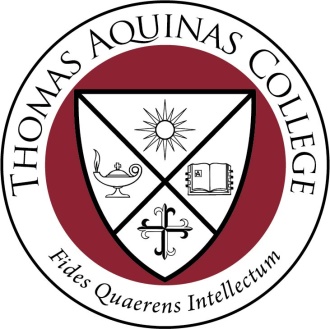
B.A. Program of Studies aThomas Aquinas College (CA). Thomas Aquinas Collegebelieves that to learn is to discover and grow in the truth about reality. It is the truth, and nothing less, that sets men free. And because truth is both natural and supernatural, the College offers a program of studies that aims at both natural and divine wisdom. The curriculum presents the arts and sciences of liberal education as a comprehensive whole. There are no majors, no minors, no electives, and no specializations. The four-year interdisciplinary course of study makes use of the original writings of the great philosophers, historians, mathematicians, poets, scientists, and theologians of the West. There are no lectures in the classroom. The curriculum is a sustained conversation in the form of tutorials, seminars, and laboratories guided by tutors who assist students in the work of reading, analyzing, and evaluating these great books. Students develop the lost tools of inquiry, argument, and translation — in critically reading and analyzing texts, in mathematical demonstration, and in laboratory investigation. For additional information visit, https://thomasaquinas.edu/
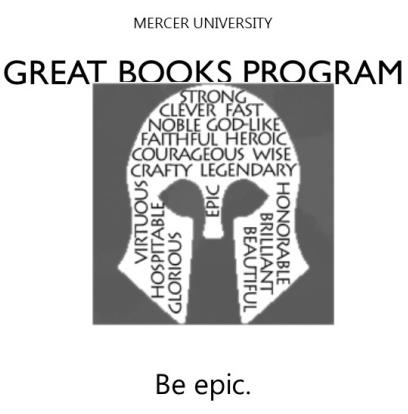
Great Books Program at Mercer University (GA).Mercer’s Great Books Program is committed to the idea that each generation of citizens must engage and confront for itself the traditions that it inherits, and that true inheritance of such traditions comes through understanding, which is only made possible by serious study. Faculty and students are new interlocutors in an old, complicated, and sometimes contentious conversation about some of the most important questions that human beings have ever or will ever face. The Great Books Program consists of eight courses, all seminar-based. Through a survey of political, religious, philosophical, and scientific thought, students increase their skills in disciplined thinking and effective writing, can heighten their moral and ethical reflectiveness, and can understand how the seminal ideas of the past have formed our twentieth and twenty-first century selves. For additional information visit, http://greatbooks.mercer.edu/

Shimer Great Books School at North Central College (IL). The Shimer Great Books School provides and preserves education centered on discussion of enduring questions and issues. Historically influential original sources are studied through Socratic questioning in small seminar classes, following the kind of Great Books curriculum advocated by Robert Maynard Hutchins. The core values informing education at Shimer are free inquiry, dialogue, critical open-mindedness and integration of disciplines. A Shimer education demands much of both the intellect and the character of students, and prepares them for responsible citizenship and the examined life. For additional information visit, https://www.northcentralcollege.edu/shimer-great-books-school

Great Books Program at Benedictine College (KS). The Great Books Program at Benedictine College leads students to ponder fundamental questions through the greatest texts from classical antiquity to modernity, from Homer to Aquinas and from Dante to Dostoevsky. The Program is an option for students who want to fulfill general education requirements in a more traditional Liberal Arts format. Because the Liberal Arts constitute one of the four pillars of a Benedictine education, many courses at Benedictine College qualify as Great Books courses. Our specific Great Books courses follow a chronological sequence, which follows over four semesters the historical development of human thought and imagination in history: The Ancient World, The Middle Ages, The Renaissance and The Moderns. The courses are open to all students, whatever major, allowing anyone who wants to encounter history’s great minds in a seminar environment the ability to enroll. For additional information visit, https://www.benedictine.edu/academics/great-books/index
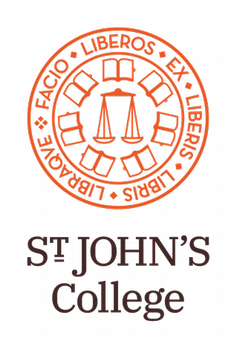
Undergraduate Program at St. John’s College-Annapolis (MD).St. Johns’ College-Annapolis, a true liberal arts college, is first and foremost a community of learning. Offering a comprehensive undergraduate liberal arts program St. John’s College-Annapolis seeks to raise essential questions that give rise to sustained and thoughtful discussion. At the heart of St. John’s is a liberal arts curriculum that is conceived as a coherent program of study, which immerses students in reading great books and in lively and unmediated conversation with one another. The comprehensive perspective of the seminar is balanced and supported by the more detailed work and technical activities of the tutorials: in these classes, students study language, mathematics, science, and music. For additional information visit, https://www.sjc.edu/academic-programs

Fortin/Gonthier Core Texts & Enduring Questions Program at Assumption College (MA). The Fortin/Gonthier Core Texts & Enduring Questions Program is a unique program at Assumption College. This select Catholic liberal arts program offers an intellectually rich interdisciplinary minor that complements any pre-professional, natural science, mathematics or humanities major. Students attend lectures by nationally known speakers, compete in essay contests, take part in intercollegiate student research conferences, and travel on CTEQ class-related trips to major cities in the United States and Europe. Specifically designed for select students seeking an intense and integrated liberal arts education as they simultaneously pursue a specialized major, the CTEQ minor brings faculty and students together to study great works of human thought not simply to learn something about them and their authors, but more importantly to learn something vital and enduring about ourselves as human beings. For additional information visit, https://www.assumption.edu/undergraduate/core-texts-enduring-questions

Program of Studies at Thomas More College of Liberal Arts (NH). Thomas More College of Liberal Arts was founded to provide a solid education in the liberal arts, a Catholic education for students of all faiths, united in the quest for what is true, good, and beautiful. It pursues this mission by seeking wisdom and sharing it joyfully with the world. The Program of Studies roots the world of abstract ideas in concrete reality, enabling students to engage the world with mind, body and soul. Students read the finest works of civilization from Antiquity through the Middle Ages and into the Modern Age. Distinctive elements of Thomas More College’s Program of Studies include reading the great authors themselves, study in Rome, and upper level tutorials enabling students and faculty to partner in the creation of a course of study tailored to their academic interests. For additional information visit, https://thomasmorecollege.edu/the-core/program-of-studies/

Core Curriculum at The King’s College (NY). Through its commitment to the truths of Christianity and a biblical world view, The King’s College seeks to transform society by preparing students for careers in which they shape and eventually lead strategic public and private institutions, and by supporting faculty members as they directly engage culture through writing and speaking publicly on critical issues. The Core Curriculum is the foundation of a King’s education. All students take the entire Core Curriculum throughout each four-year program to develop a broad and coherent intellectual foundation for informed and thoughtful leadership in successful careers after graduation. This interdisciplinary approach comprises the ruling disciplines of politics, philosophy, and economics in tandem with the traditional liberal arts – history, literature, theology, science and math. For additional information visit, https://www.tkc.edu/academics/#core-curriculum

Honors College at Belmont Abbey College (NC). The Honors College at Belmont Abbey College is an unique opportunity for students who love reading, are quietly perceptive and enjoy listening to, or participating in, discussions of important matters both in and out of the classroom. We turn primary attention to the reading of books which implicitly or explicitly make a bold claim of wisdom about the most important matters in human life. This kind of reading asks much of students and their teachers. The efforts of all are rewarded with a breadth and depth of understanding that is one of the most important accomplishments of a liberal education. Unique is a substantial focus in our curriculum on writers sometimes referred to as “Ancients, Christians and Moderns.” Prominent in our consideration of these authors are the shaping effects they have had on life in the 21st century. For additional information visit, https://belmontabbeycollege.edu/academics/honors-college/

Ashbrook Center at Ashland University (OH). The Ashbrook Center seeks to restore and strengthen the capacities of the American people for constitutional self-government. Ashbrook teaches students and teachers across the country what America is and what she represents in the long history of the world. Ashbrook creates informed patriots. Ashbrook Scholars experience a learning environment far removed from a standard college education. They study the Declaration of Independence and the Constitution, as well as everything from Homer and Aristotle to the Federalist Papers and the speeches and deeds of America’s greatest statesmen, and develop a deep understanding of America’s founding principles. An integral part of the education of an Ashbrook Scholar is the hands-on, real-life experience in public affairs provided through internship opportunities. For additional information visit, https://ashbrook.org
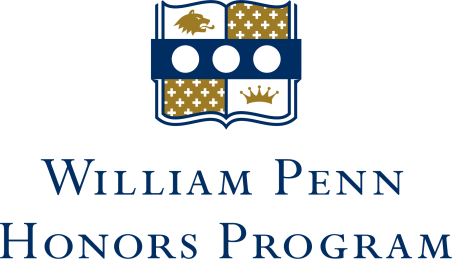
William Penn Honors Program at George Fox University (OR).The William Penn Honors Program provides an excellent great books education that forms students to be Christian thinkers who will go forth into the world and strengthen the church in the 21st century. This program is distinctive among great books programs for its tight-knit community and grounding in the transcendent truths of Christian thought. Honors students embark on a four-year journey through the Great Conversation, reading the most influential works that have shaped – and continue to shape – human history and thought. Honors professors guide conversations in small Socratic seminars, as students consider the enduring imprint of human experience within the great works, ancient to modern. Honors students are invited into a welcoming community of motivated peers and engaged faculty dedicated to both the intellectual and spiritual formation of their students. For additional information visit, https://www.georgefox.edu/honors-program/index.html

Templeton Honors College at Eastern University (PA). Templeton Honors College strives to be recognized as a premier liberal arts institution challenging students with an academically rigorous education in the Christian classical tradition. Templeton emphasizes critical study and engagement with great books, great conversations, and great lives, and prepares gifted students to become thoughtful leaders in their professional and personal lives. What makes Templeton truly distinctive, however, is its pedagogy, which involves reading- and writing- intensive seminar courses, a great books general education curriculum, and the rich community built through the cohort model. Templeton students are not just pre-professionals looking for credentials, but rational, spiritual individuals who seek a coherent world-view. For additional information visit, https://templetonhonorscollege.com
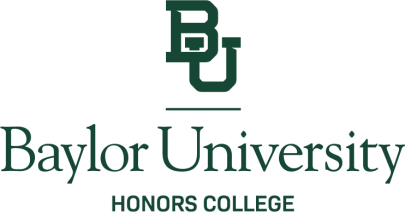
Honors College at Baylor University (TX). The Honors College at Baylor University unites four innovative programs fostering a community of students and faculty devoted to the love of learning, the cultivation of wonder, and the pursuit of life’s most important questions through rich conversations. In the Great Texts major students study foundational works of literature, theology, and philosophy in seminar-style classes; consider the questions that contemporary disciplines set aside; and explore the connections between what we know, how we live, and what we enjoy. In the University Scholars major students of high-ability who love interdisciplinary discourse in the liberal arts and sciences chart a personalized educational journey in consultation with faculty advisers. The Baylor Interdisciplinary Core explores the interrelation of humanities and social sciences, providing students with a broad context to understand the contemporary world. Exploring literature and thought from around the world, BIC students receive a global education. The Honors Program is designed for students who love to learn and inquire more deeply into their subjects. For additional information visit, https://www.baylor.edu/honorscollege/
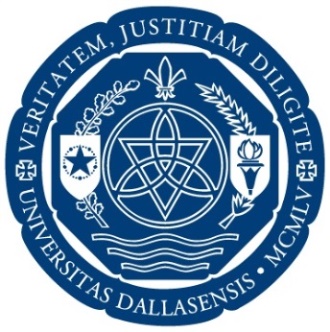
Core Curriculum at University of Dallas (TX). The Core Curriculum embodies the University of Dallas’ dedication to the pursuit of wisdom, truth and virtue as the proper and primary ends of education. It is a shared sequence taken by all undergraduates that consists of 19 courses in English, history, philosophy, theology, economics, politics, science, mathematics, language and fine arts. During the course of study, students read the great works that have shaped Western civilization and discuss these works with their peers in small classes. Professors and students engage in thoughtful, meaningful dialogue that develops critical thinking skills and inspires a love of intellectual inquiry that will serve students throughout their academic careers and the rest of their lives. For additional information visit, https://udallas.edu/constantin/core-curriculum/index.php

Thomas Jefferson Center for the Study of Core Texts and Ideas at the University of Texas-Austin (TX). The Thomas Jefferson Center for the Study of Core Texas and Ideas is unique among UT-Austin’s myriad departments and centers. The Center’s focus is not an academic discipline, a region, a time period, or any specialized body of knowledge in which we train graduate students and undergraduate majors; nor is it applied knowledge aimed at some particular vocation. The Center’s mission is rather to counter the modern university’s drift towards fragmentation and specialization by creating a locus of sustained dialogue about questions of enduring significance and providing new ways for undergraduates to integrate their studies. The Certificate Program in Core Texts and Ideas is an introduction to the liberal arts through the study of the great books. Four fundamental courses introduce students to major works of religion, literature, philosophy, and political thought in the west from ancient to modern times. Electives cover specialized topics, such as ancient Indian thought, Shakespeare, and Darwin. In all courses students enter into debates about human nature, ethics, and the meaning of life that have unfolded over centuries and that have profoundly shaped the modern world. For additional information visit, https://liberalarts.utexas.edu/coretexts/about/About.php
